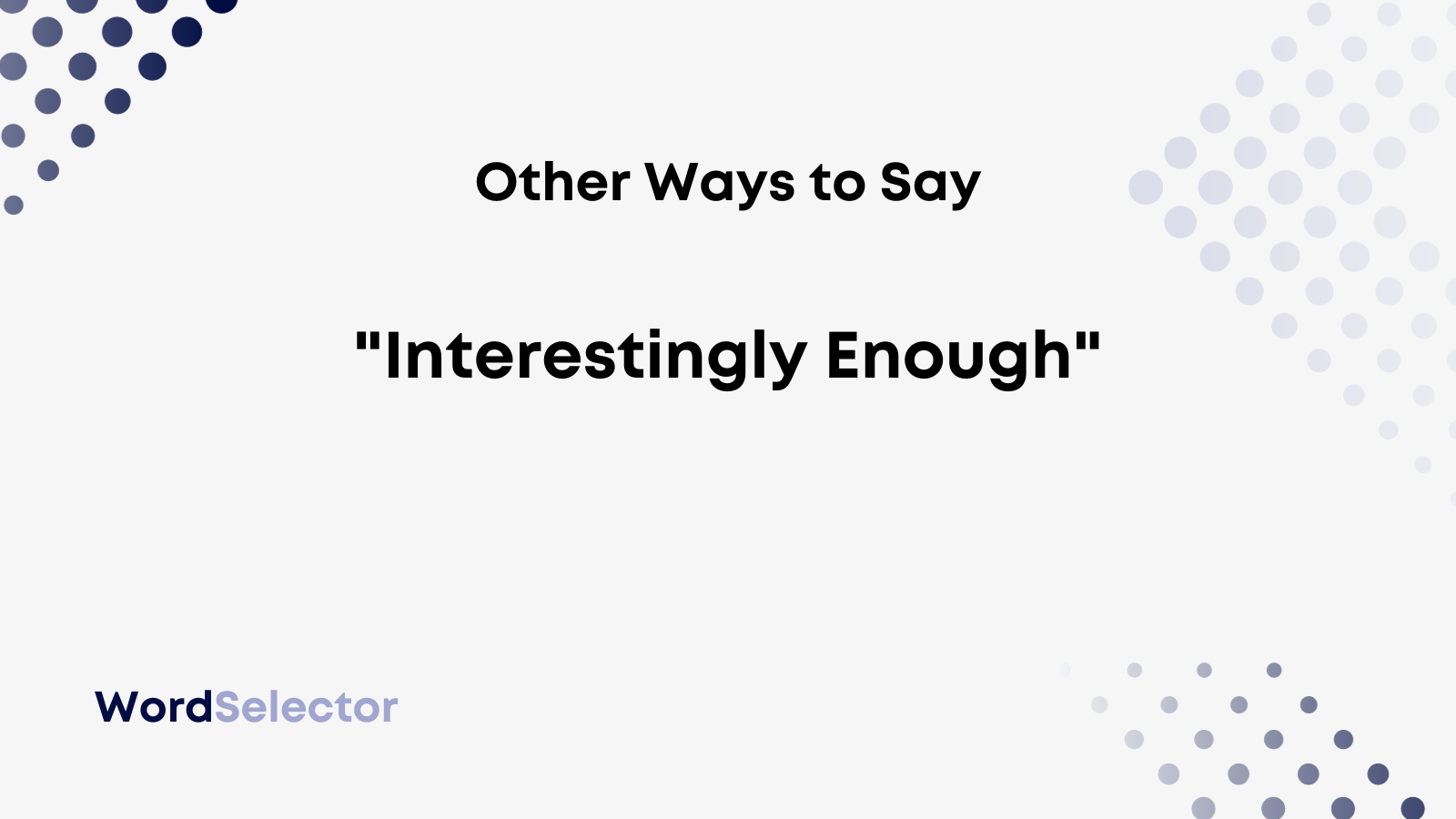So, you’re interested in a fact, and you want to find a way to express it in your writing.
Perhaps you’re worried that “interestingly enough” isn’t suitable or sounds a bit informal.
Well, you’ve come to the right place.
This article will show you what to say instead of “interestingly enough” to keep your writing informative and exciting.
Other Ways to Say “Interestingly Enough”
- In a surprising twist
- Remarkably
- Surprisingly
- Curiously enough
- Strangely enough
- In a curious turn of events
- Peculiarly
- Unexpectedly
- In a rather unusual manner
- Unbelievably
- Notably
- In a remarkable fashion
- Intriguingly
- Ironically
KEY TAKEAWAYS
- “Interestingly enough” is formal and correct, so we recommend including it in your essays to keep things engaging.
- Try “in a surprising twist” as a formal synonym to keep things interesting and engage your readers.
- “Remarkably” is suitable as an informal alternative, so we recommend trying to use it to spice things up.
Keep reading to learn another way to say “interestingly enough.” We want to share the best two alternatives with you and explain how they work to help you engage your readers at all times.
Also, you can read the final section to learn whether it’s correct to say “interestingly enough.” That way, you’ll know whether it’s worth including it in your writing.
In a Surprising Twist (Formal)
You can use “in a surprising twist” as a formal way to say “interestingly enough.”
It’s a great phrase that shows how something has changed in a company. It allows you to show surprise (even if it’s not serious) when emailing someone.
Try using it when emailing your staff. It’s a great choice as it shows that you didn’t expect something to happen the way that it did.
Generally, this also helps you to keep things a little more entertaining in your emails. Even professional emails can benefit from a bit of a light-hearted twist here and there.
Feel free to refer to this email sample to learn more about it:
Dear Hillary,
In a surprising twist, our clients have decided to cancel the project. Therefore, you may take the rest of the day off.
Best regards,
Jon Watkins
Or you can refer to this sentence sample to learn how to use “in a surprising twist” in a sentence:
In a surprising twist, this information changed the way I thought about the conclusion. I had to reconsider my hypothesis.
Remarkably (Informal)
For something more informal, you can write “remarkably.”
This is a great one-word variation on “interestingly enough” that shows how something surprises you.
Generally, you can use “remarkably” when you’re caught off guard by something. It suggests that you didn’t see something coming, and you’re quite impressed that it happened the way it did.
Use it when emailing a coworker. It’s a good option, as it shows that you didn’t see something coming and you want to update them because you think they’re on the same page.
You may also review this email example to learn more about how it works:
Hi Andy,
Remarkably, I wasn’t told about any of these changes. Nevertheless, I’ll do what I can to implement them.
Thanks so much,
Harry Stone
Also, refer to this sentence example to learn how to use “remarkably” in a sentence:
Well, remarkably, this was quite an exciting find. I’m going to use it as we move forward to see what it changes.
Is It Correct to Say “Interestingly Enough”?
It is correct to say “interestingly enough.” It’s a great phrase that explains how you find something interesting, especially if it’s unexpected.
Generally, it’s quite formal. For instance, you can include it in an essay to explain how you’re interested in a fact.
Refer to these essay samples to learn how to use “interestingly enough” in a sentence:
This is the only way they could think of. Interestingly enough, there were a few other options. They just didn’t care.
Interestingly enough, I discovered this entirely by accident. I’m not sure how I got there, but I’m glad I did.
You need to make sure you use the adverbial form of “interesting,” though. Using “interesting” on its own is incorrect.
For instance:
- Correct: Interestingly enough, I could not figure this out.
- Incorrect: Interesting enough, this is the wrong phrase.
Don’t go just yet, though! Before you leave, you should bookmark this page! That way, you’ll always have the synonyms for “interestingly enough” on hand when you might need them again.

